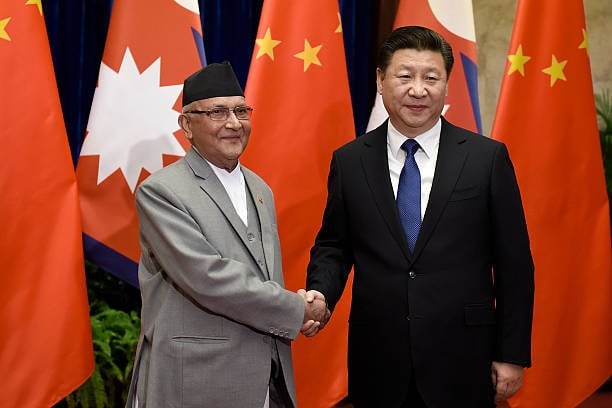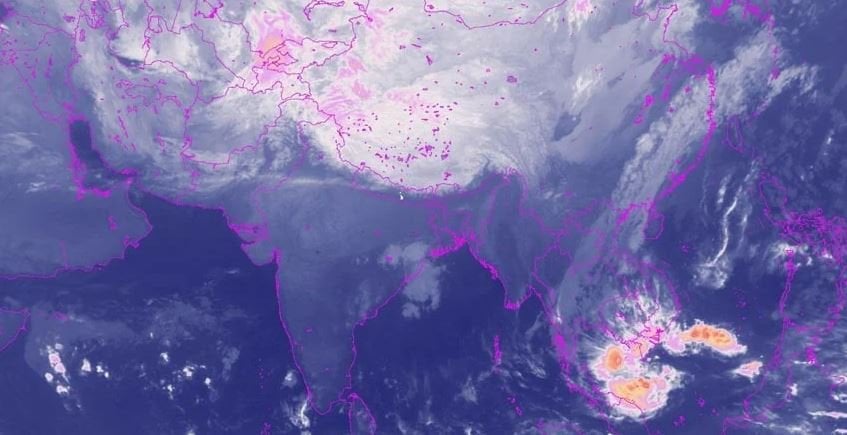Editorial: BRI implementation, a litmus test of PM Oli

Prime Minister KP Sharma Oli has embarked on a four-day visit (December 2-5) to the neighboring country, the People's Republic of China.
Given that this visit involves a jumbo delegation with millions of rupees spent from the state coffers, it is natural to expect that this visit will not be limited to mere sightseeing or ‘pilgrimage’. The significance of this visit will depend on the agreements made regarding the implementation of the 'Belt and Road Initiative' (BRI).
Nepal signed the BRI project in 2017. However, there has been ongoing debate in political circles about the initiative from various perspectives, which has hindered its implementation. Due to geopolitical positioning of Nepal and the focus of political parties on their own interests rather than the country’s welfare, the discussions surrounding this project have remained contentious.
The ruling coalition parties, the Nepali Congress and the CPN (UML), have agreed to take BRI as a grant and not as a loan. Based on this understanding, the government has pushed forward with new projects under the 'BRI framework,' including the Tokha-Chhahare tunnel road, Hilsa-Simikot road, Kimathangka-Khandbari road and bridge, Jilong/Kerung-Kathmandu cross-border railway, Kathmandu-Hetauda Podway, Amargadhi City Hall in Dadeldhura, Jilong/Kerung-Rasuwagadhi Chilmie 220 kV cross-border transmission line, Kathmandu Valley transmission line upgrades, Madan Bhandari University, Kathmandu Scientific Center and Science Museum, the China-Nepal Industrial Friendship Park in Damak, and the Jhapa Sports and Athletics Complex.
Although the government has diplomatically advanced these proposals, Prime Minister Oli publicly stated earlier that Nepal would not sign any loan agreements with China before the visit, disregarding basic diplomatic norms.
Nepal’s diplomacy is still immature. The priorities and strategies of the government and leaders change according to their partisan interests. Prior to the Prime Minister’s visit, Foreign Minister Dr. Arzu Rana visited China. During her visit, if she had formally proposed projects under the BRI framework, that would have allowed the People's Republic of China to carry out necessary preparatory work. However, without an agenda, she arrived in China, completed the formalities, and returned, raising questions about Nepal's preparations and diplomatic capacity. Both Prime Minister Oli and Foreign Minister Rana failed in this regard, leaving a cloud over Nepal’s diplomatic maturity and credibility.
At this point, it is the Prime Minister’s diplomatic and strategic skills that are expected to make this visit productive. His recent statements have encouraged those spreading rumors that Nepal would fall into a debt trap if BRI were implemented. Some are creating a false narrative that Nepal is tilting towards China.
Nepal's diplomacy remains immature, with shifting priorities and strategies depending on the government in power. For example, political debates were doing rounds prior the endorsement of the Millennium Challenge Corporation (MCC) from the sovereign parliament. It can be taken as a project that helps in the economic development of participating countries. Nonetheless, it is now being implemented, which is a positive development.
Currently, the BRI is facing the same fate as the MCC project. It is trapped in internal and geopolitical interests. Political parties are interpreting the project in their own ways, and there seems to be little effort to build national consensus on how to move it forward. The government did not try to develop a shared view with all political forces in the country, nor did it promote in-depth discussions in the sovereign parliament.
BRI must be viewed through Nepal's own lens rather than from the perspectives of China, India, or the U.S. The decision and approach should be based on our current capabilities and the future needs of the country. If implemented without dispute and the projects are carried out, it will benefit Nepal.
BRI is a huge and ambitious project. It is not only about connectivity through railways and roads. The BRI focuses on policy and economic coordination, infrastructure including railways and highways, open trade, and people-to-people relations. So far, 152 countries have signed agreements under BRI. China plans to invest billions in infrastructure projects under BRI in regions like Asia, Africa, and South America, which are facing major infrastructure deficits. For this reason, many countries in the Global South are optimistic about this initiative. Nepal, a developing country, will not suffer any losses from it.
Whether or not the BRI project proceeds as a grant now depends on the diplomatic and political capabilities of Prime Minister Oli as well as China's willingness.
What’s the issue? China has a large budget and is an exemplary country in global infrastructure development. We need infrastructure. If China is willing to invest in infrastructure for its own benefit, how can that be a disadvantage for us? Before the agreement on MCC, there were rumors of American troops invading and taking over Nepal, and now similar rumors are making rounds with regard to BRI. The reality is that all major powers, including China, India, and the U.S., have their own interests. We need to demonstrate the strategic skill to use these interests for the benefit of our country.
Due to the country's economic situation and the diverse geopolitical factors at play, it is difficult for Nepal to reach a solid agreement on whether to take loans or grants. The argument that Nepal cannot bear the burden of loans for BRI projects seems practical.
The government has, albeit late, clarified its stance on BRI by advancing projects under the framework. Now, the path for the implementation of BRI is open under this framework.
On the one hand, the diplomatic skills Prime Minister Oli displays during his visit to China will determine the future of BRI implementation, and on the other hand, the Chinese government, which has become a global power, must also listen to Nepal’s voice with sincerity. China must understand Nepal’s internal political struggles and geopolitical constraints. In this context, China must show goodwill in operating the BRI projects as grants, as it does not face any internal or geopolitical discomfort in making this decision.
Whether BRI progresses as a grant or not now depends not only on the diplomatic and political skills of Prime Minister Oli but also on the stance of the Chinese government. At this stage, the issue of whether or not to proceed with BRI implementation will be a "litmus test" not only of Oli’s diplomatic abilities but also of China's attitude toward Nepal.
May both Nepal and China pass this challenge with flying colors!
Click here to read this editorial in Nepali.









Leave Comment